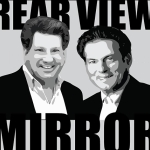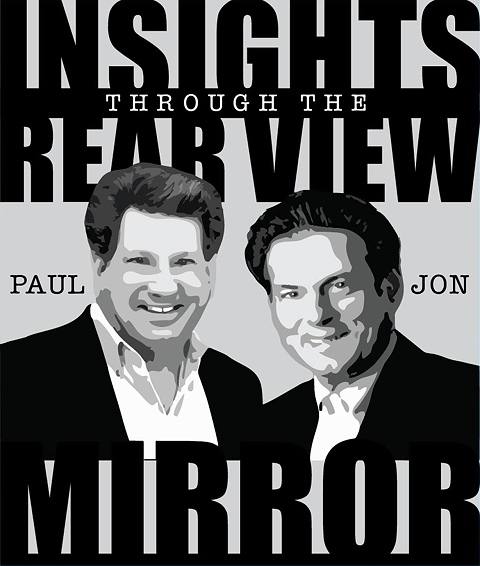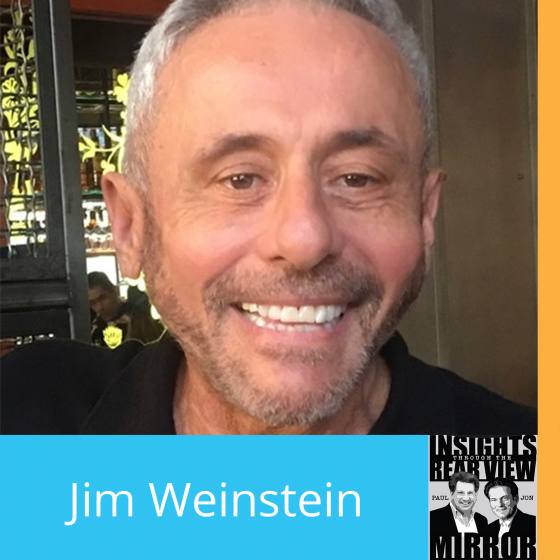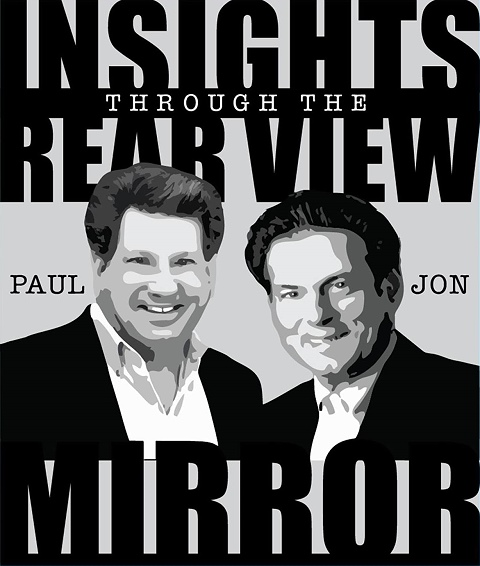Insights Through the Rearview Mirror, January 22, 2021
Insights Through the Rearview Mirror with Jon Kramer and Paul Kramer
Jim Weinstein: Charting The Path From Advertising to Advising
Too many people equate decisiveness with urgency and snap judgments. This often leads to decisions that they quickly regret making. Today’s guest makes the case that the more time you take in making big decisions (within reason, of course), the more perspective you gain and, in turn, the more confident you become when you finally pull the trigger.
We address:
How can I set principles for myself to abide by when making tough decisions?
Why should I let the decision-making process play out as opposed to having a sense of urgency?
What can I do to minimize anxiety when making big decisions?
Jon welcomes Jim Weinstein, life consultant, career coach, and psychotherapist. Jim goes down memory lane, sharing why he decided to go into the advertising world after graduating with a degree in political science. He then explains his decision to leave advertising to run a clinical trials organization and how that eventually led to his current passion for life coaching.
3 MAJOR POINTS DISCUSSED
-
Don’t be locked into a rigid framework for decision-making. Instead, stick to a few key principles that help guide your thought process as you reflect on tough choices. Some simple examples include: Where are you?; What are you happy with?; What are you unhappy with? Aside from taking inventory and thinking through the decision yourself, it also helps to talk to other people who know you well for third-party input. Finally, try “dipping your toe into the water”. Tentatively try out a new path for a visceral reaction to see how you resonate with it.
-
Give your decisions room to breathe. Whatever the principles you decide to abide by, making good decisions comes down to patience and diligence. Never settle for a snap answer or set arbitrary deadlines for making decisions (i.e. decide in the next 30 days) if there is no real reason for a deadline. Take your time and weigh out every factor going into your big decision. You’re only going to make the decision once.
-
The biggest barrier to effective decision-making is anxiety. Many are pressured, unjustifiably, into making big decisions faster than they need to. Even more commonly, a lot of people are afraid that their life will fall apart if they make a wrong decision. A calm, measured approach to making decisions is a great recipe for success. In any case, bad decisions and failures can be great teachers if you allow them to be. They can uncover aspects of yourself that you didn’t even know were there. Embrace failure. Failure isn’t the end of the world.
OUTLINE OF THIS EPISODE
-
Jim’s decision-making framework [02:49]
-
Two key ingredients to effective decision-making [04:59]
-
Why Jim got into business and advertising after studying political science [06:24]
-
Leaving the advertising business to run a clinical trials organization [08:24]
-
Stepping away from anxiety and couples therapy to becoming a life coach [11:33]
-
Helping coaching clients make life-changing decisions [15:44]
-
The biggest barriers to making good decisions [16:39]
-
Why bad decisions and failure can be great teachers [18:19]
-
How to embrace failure [19:45]
-
Why Jim would not have done anything differently [20:58]
-
The benefits of a calm and curious approach to decision-making [22:18]
ABOUT OUR GUEST
Jim Weinstein is a life consultant, career coach, and psychotherapist. He attended Wesleyan University where he majored in political science and minored in Romance languages.
Graduating magna cum laude, Phi Beta Kappa, Jim was accepted to Harvard Business School, where he concentrated in marketing. He graduated with distinction in 1971, and thereafter began working at one of New York's largest advertising agencies, Benton & Bowles, as an account executive.
Jim rose quickly in the organization, being named a vice-president in 1975. In the subsequent 15 years he also worked with several other firms as a senior executive, including Wells Rich Greene as EVP & Chiat/Day as Director of Account Management. Among the clients he worked for were: Procter & Gamble, Sony, Coca-Cola, Bayer, Mitsubishi, Fisher-Price, and Energizer (The bunny was developed under Jim’s tenure as the lead account manager).
In Jim’s early 40s, he embarked on a process of inner work and exploration that led him to move from New York to Los Angeles and decide to leave advertising. After serving for two years as the president of Search Alliance, a community-based clinical trials organization, he enrolled in Antioch University's clinical psychology program in 1994, earning a Master's degree. He also accumulated 3,000 hours of internship training and was licensed as a psychotherapist (Marriage and Family Therapist). Jim opened a private practice in Beverly Hills working with couples and individuals struggling with a wide variety of issues.
In late 2005, Jim moved from Los Angeles to Washington, pivoting from a strict focus on psychotherapy to broadening guidance to include career and general life satisfaction issues. In the time he has been in the DC area, Jim has been fortunate enough to build a thriving practice working with a very diverse, motivated, and intelligent group of clients. He is proud to have helped many hundreds of clients to dramatically improve their career and life satisfaction.
Insights Through the Rearview Mirror

“If I Knew Then What I Know Now – Insights Through the Rearview Mirror”
During the height of the Covid-19 Pandemic, marketing executives, and brothers, Jon and Paul Kramer were discussing the decisions each had made in their lives. The good, bad, big and small and how each of these decisions had informed and transformed their lives.
Out of these heartfelt conversations came the idea of helping others make more considered decision in their lives. And, while there are literally thousands of books on decision making, they started to discuss how to improve on these “how-to” text books to make the art of better decision making easier and more gratifying.
An ongoing theme was “If I knew then what I know now…”
“If I Knew Then What I Know Now – Insights Through the Rearview Mirror” is a journey through the decision-making process of interesting people. The question we will attempt to answer is there a decision-making framework that can lead to a more successful process? A way that will help you make better decisions.
In each episode, we will talk to interesting and intriguing guests about the decisions they have made in their lives, exploring the constructs they may have used and the learning that they have found in their very own “If I Knew Then What I Know Now” journey. Through these discussions, we will illuminate and amplify better ways to approach decisions and help you avoid deciding for the wrong reasons.










